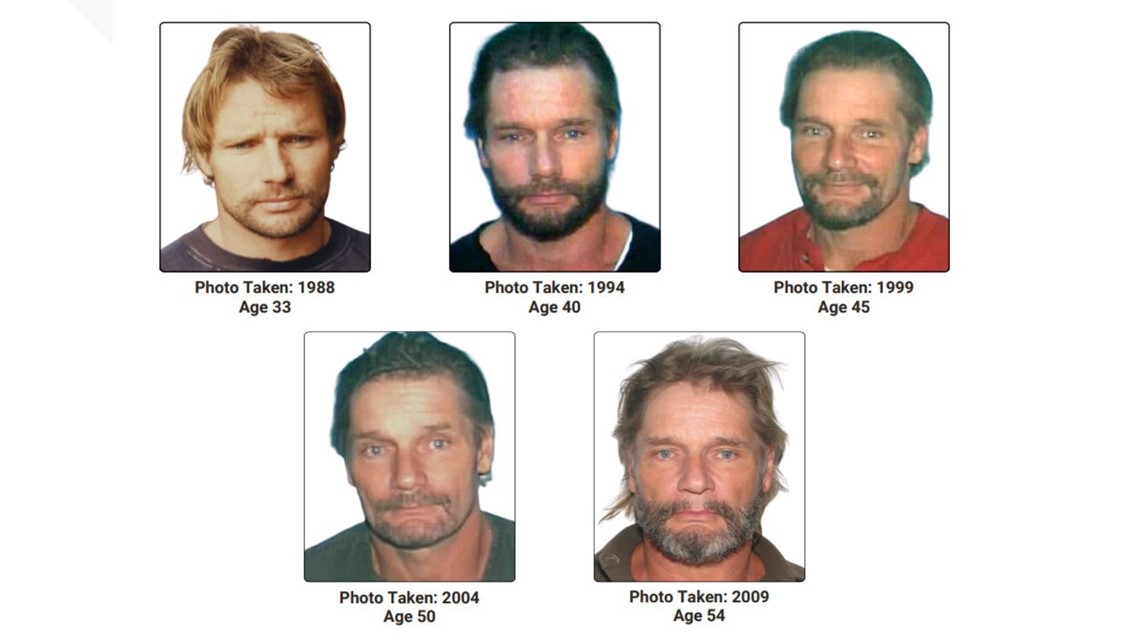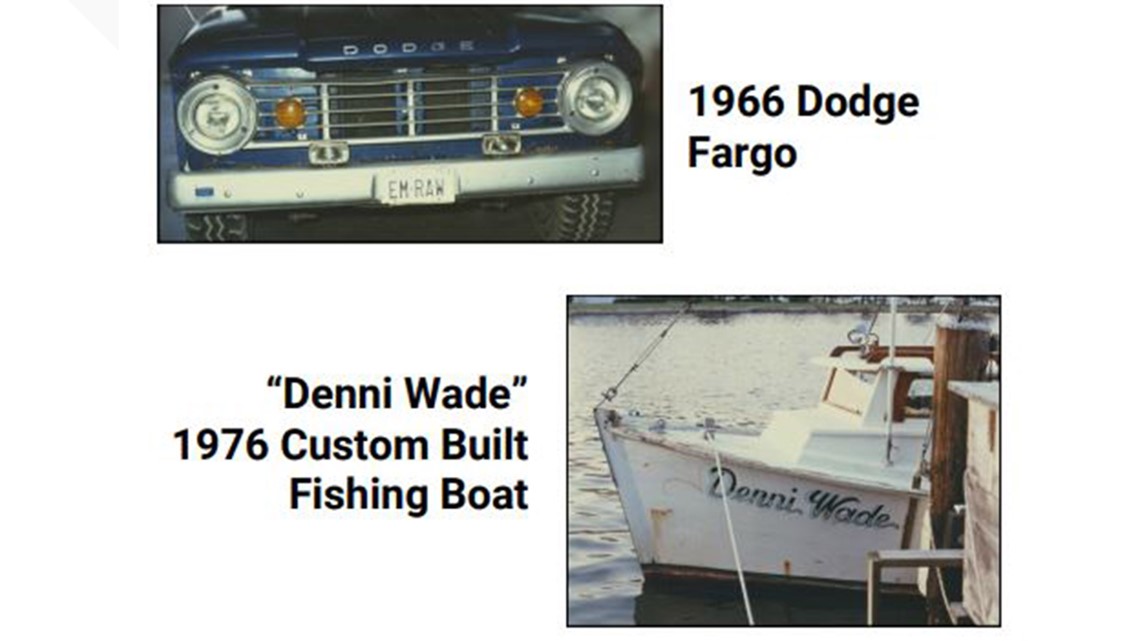ISLE OF WIGHT, Va. — Laws surrounding DNA collection are preventing Virginia State Police from easily verifying whether a recently named cold case killer could be linked to even more crimes.
If he were alive today, Alan Wade Wilmer Sr. would be charged with the murders of 20-year-old David Knobling and 14-year-old Robin Edwards in Isle of Wight in 1987, and the murder of 29-year-old Teresa Howell, 29 in Hampton. Under the FBI's definition, the three homicides would make Wilmer a serial killer.
The Knobling and Edwards murders were long considered part of the Colonial Parkway killings, which still include six more unsolved murders.
Authorities are now investigating whether Wilmer, who died in 2017, took even more secrets to the grave.
13News Now Investigates has learned at least one Hampton Roads police department recently checked Wilmer’s DNA to see if he was a match for one of their unsolved cold cases. Another local police department is currently reviewing all sexual assault cases that match Wilmer’s modus operandi (MO), and a third local police department spent part of January reviewing more than a dozen cold cases from the 1970s and 80s to see if Wilmer was ever on their radar, and whether he could be considered a suspect today.
More law enforcement agencies could follow suit.
But is a legal loophole leaving a potential trail of unsolved crimes unexplored?
CODIS – or Combined DNA Index System – could instantly confirm whether Wilmer’s DNA sample matches DNA that was once collected at a crime scene and entered into the universal database.
But Virginia State Police say State law requires someone to have a conviction on their record before their DNA profile is entered into the government-run CODIS.
And a conviction is something this dead man will never have.
Wilmer, a fisherman from the Northern Neck, spent 63 years living a double life with such great success that he was never charged with any felony.
Now, six years after Wilmer’s death, 13News Now Investigates joins the likes of the Virginia State Police, the Federal Bureau of Investigation, and families of unsolved cold case murders asking: was Alan Wilmer Sr. responsible for other cold case homicides in Hampton Roads?
HOW DID POLICE GET ALAN WILMER SR.’S DNA?
When Alan Wilmer Sr. died at his Lancaster County home in 2017, it took at least a month for his remains to be found.
His body was so badly decomposed that the sheriff’s office needed to obtain his DNA in order to make a positive identification. The Medical Examiner in Richmond ruled the 63-year-old died of natural causes, specifically, atherosclerotic cardiovascular disease.
That DNA sample then sat in a database until mid-2023 when investigators checked to see if it was a match for two murder cases from more than 30 years ago.
Virginia State Police would not say what led to the sudden decision to test Wilmer's DNA profile.
Instead, a spokesperson credited cooperation across local, state, and federal investigators for "the sharing of information, evidence and the DNA profile."
WHY IS WILMER’S DNA NOT IN CODIS?
Law enforcement agencies routinely use CODIS to cross-reference DNA profiles from crime scenes with those of known offenders in the hope of solving more cases.
But in Wilmer’s case, his DNA has not yet been entered into the database, leaving the possibility of connections to other unsolved crimes unexplored.
The brother of one of the first victims in the Colonial Parkway murders said DNA could ultimately link a suspect to his sister’s killing.
“His profile needs to be uploaded to CODIS, and we’re very concerned it has not yet been uploaded to CODIS,” said Bill Thomas, whose sister Cathy was murdered in 1986.
Wilmer’s DNA was not uploaded to CODIS due to the lack of an actual "conviction," which VSP Spokeswoman Corinne Geller said is required by CODIS policy.
But according to Virginia State Law, people arrested for murder have their DNA taken and immediately put into CODIS, well before any conviction.


Ashley Spence, the founder of the DNA Justice Project, said the problem in this case is that Wilmer is dead and will never be arrested, much less convicted.
“CODIS is a very, very good system. It’s very regulated, which I think is a good thing, but then you come into circumstances like this where you can see an opportunity for improvement,” Spence said.
Spence should know. She survived a home invasion rape in 2003. It took seven years, but her attacker was finally identified in 2010 through a match in CODIS. Now, she travels the country as an advocate for getting more offenders into the database.
“DNA is science. It’s truth, and it’s accurate,” Spence said.
SO THEN HOW WAS WILMER TIED TO THREE MURDERS?
The Virginia Department of Forensic Sciences developed a common suspect between the Knobling and Edwards murders and the Howell murder a couple of years ago, according to VSP.
However, because Wilmer was not in the CODIS database, he was not immediately identified. Instead, VSP said it took multiple agencies sharing information, evidence, and ultimately Wilmer’s DNA profile that led them to him.
Edwards and Howell were both sexually assaulted and the Sexual Assault Kit Initiative (SAKI) played an integral role in these investigations, according to Virginia Attorney General Jason Miyares, whose office paid for the crime analysts that ultimately discovered the perpetrator in the two homicides was the same man.
We asked the Attorney General’s office whether Miyares could use his position as Virginia’s top cop to have Wilmer’s DNA entered into CODIS.
But, according to his spokesperson, the answer is no.
“The Attorney General’s office doesn’t have jurisdiction to intervene in an ongoing investigation,” a spokesperson said.
COULD WILMER BE RESPONSIBLE FOR MORE MURDERS?
It’s not inconceivable that a suspect already tied to three murders in two different localities may be responsible for crimes in other neighboring cities and counties.
Virginia State Police say they are not ruling anything out when examining Wilmer’s potential involvement in other cases.
Bill Thomas believes this isn’t the last case to which Wilmer will be connected.
“We believe he will be linked to a number of other homicides in Virginia,” Thomas said. “I believe he has killed at least two of the couples in the Colonial Parkway murders, and he may be involved in the murder of my sister Cathy Thomas and Rebecca Dowski’s murder, as well.”
Virginia State Police said no forensic or physical evidence connects Wilmer to the other Colonial Parkway murders... at this time.
ARE OTHER POLICE DEPARTMENTS LOOKING INTO WILMER?
Wilmer often lived on his custom-built boat during the time of the murders, according to investigators.
He would dock it on marinas in Gloucester and Middlesex Counties, as well as around the Northern Neck and Hampton Roads region.
Hampton Police confirm to 13News Now that their investigators are currently reviewing all unsolved sexual assault reports with similar MOs that Wilmer displayed in the other rape-turned-murder cases.
“There are several individuals on standby to chase down any leads that may come about in reference to Wilmer,” a Hampton Police Sergeant said.
At the Suffolk Police Department, 13News Now has learned that investigators have already completed a check to see if Wilmer’s DNA could be a match for an unsolved homicide in their city.
On February 3, 1988, some fishermen found a body in a marshy area of the James River in Suffolk. The body was later identified as missing 25-year-old Brian Pettinger, who was last seen two months earlier at a Hampton dance club. At the time, some people theorized that his death could be tied to the Colonial Parkway Murders.
But a spokesperson for the City of Suffolk would not confirm if the case they recently tested for was Pettinger.


The Virginia Beach Police Department’s Cold Case Unit responded to the news of Alan Wilmer Sr. by spending part of January reviewing dozens of cold cases from the 1970s and 80s.
In 1983, two young women were found dead in the Chesapeake Bay in Virginia Beach. The autopsies for Joan Zwingman and Christine Pilczak showed they had been run over by a boat propeller.
Detectives at the time theorized that the two 26-year-old women were killed by a local boater who knew his way around the Hampton Roads waterways.
“Have you ever tried to take a boat out here at night? Whoever those girls got on the boat with, was local and is still local,” an investigator said in a 1983 article published in the Daily Press.
VBPD Lt. Rachel Wigand said her detectives recently looked at that case and the unsolved murders of 11 other women around the same time as the Colonial Parkway killings.
“At this time, Alan Wilmer Sr. is not a suspect in these cold cases,” said Lt. Wigand.
In York County, which includes the Colonial Parkway, authorities never considered Wilmer a suspect in any of their cold case homicides, according to a Captain with the sheriff’s department.
Wilmer was also never on the radar of the Chesapeake Police Department, which confirmed the serial killer is not currently a suspect in any cold case homicide in the city.
“If the DNA profile of Alan Wilmer Sr. is added to the DNA database, CODIS, by the ‘arresting’ agencies, then any case anywhere which has profiles in CODIS should receive ‘hits’ or matches,” according to a Chesapeake Police detective.
Officials at the Newport News Police Department echo that statement, saying they would be notified if there was a potential match to any of the cases in which they previously submitted DNA evidence.
But a source with knowledge of the inner workers of CODIS tells 13News Now that even without Wilmer’s DNA profile uploaded to CODIS, the database would still likely match other similar cases to the ones recently solved in Virginia.
It's known as a "case-to-case hit."
“If he’s committed any other crimes in any other states, we would see matches to those other [Edwards, Knobling and Howell] cases,” the source said.
An FBI spokesperson would not confirm what other cases federal investigators may now be more closely examining.
WAS WILMER EVER ON POLICE RADAR?
The Colonial Parkway killings gripped the Tidewater region with terror and angst in the 1980s. Between 1986 and 1989, eight people were believed to have been murdered in pairs of two. Some were found on, and others found near, the Colonial Parkway, while two of them were never found at all.
But it turns out that authorities in 1988 were closing in on Alan Wade Wilmer Sr. as a possible suspect.
The FBI confirmed to 13News Now that Wilmer was identified in 1988 as a potential suspect in the disappearance and suspected murders of Cassandra Hailey and Richard Call. In fact, the now-widely circulated photos of Wilmer's 1966 Dodge Fargo truck and 1976 custom-built fishing boat "Denni Wade" were captured as Wilmer, 38 at the time, was under police surveillance.


In the book, A Special Kind of Evil, authors Blaine Pardoe and Victoria Hester write about Wilmer’s brief time on the FBI’s radar.
His distinct blue truck with the license plate "EM RAW" was matched as belonging to a peeping Tom on the Colonial Parkway. Pardoe writes that investigators surveilled Wilmer at his Lancaster County home, and even got a warrant to search his trailer.
Ultimately, Wilmer passed an FBI polygraph and police moved on to other leads.
WHAT ARE THE NEXT STEPS?
Right now, investigators are working to create a timeline and to reconstruct the movements and encounters of Wilmer.
“The FBI continues to have multiple open investigations that we are looking into to see if Mr. Wilmer is connected to – including victims Cathy Thomas, Rebecca Dowski, Richard Call, and Cassandra Hailey,” said Brian Dugan, the Special Agent in Charge of the FBI’s Norfolk Field Office.
Virginia State Police said the three murder cases currently linked to Wilmer are only considered “resolved,” not “closed.” It’s an important distinction that technically keeps the cases “open,” as authorities work to tie up any loose ends.
“Our agencies are still working to reconstruct his movements and encounters surrounding those cases and the potential for others,” VSP Spokeswoman Corinne Geller said. “Thus, we are not in a position to officially ‘close’ either case until we have exhausted all possible leads, tips, and evidence related to him.”
Geller said at this time, there is no evidence to indicate a second person was involved in either case.
Wilmer is long gone, and so are the truck and boat that VSP is asking the public to ruminate on. Neither vehicle is in the possession of authorities. But they are still hopeful the distinct images might trigger the memories of anyone who encountered those, particularly in the 1980s.
VSP is encouraging anyone who may have worked with Wilmer, hunted with him, farmed oysters and clams with him, docked next to him at marinas, or hung out with him to contact the FBI by calling I-800-CALL-FBI or submitting a tip online at www.tips.fbi.gov.
Anyone with information can also reach out to the Virginia State Police by email at questions@vsp.virginia.gov or the Peninsula Crime Line. Anonymous tips are welcome.
More than 50 tips poured into the FBI tip line in the 10 days after the news conference.
Despite the technological advances of 2024, it could be old-fashioned police work – and not the CODIS database – that potentially connects Wilmer to any more crimes.

